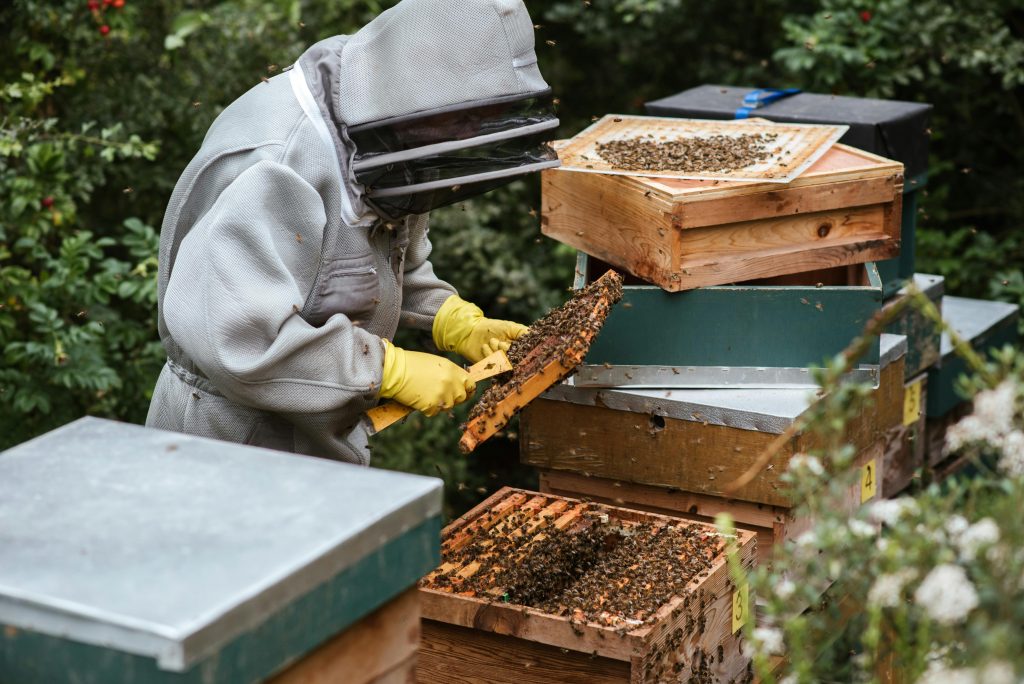
The Importance of Agriculture
A Vital Industry at Risk
Honey farming, or apiculture, in South Africa plays a critical role in the country’s agricultural sector and ecosystem. It involves the cultivation of bees for the production of honey and other bee-related products. This industry is not only a source of livelihood for many but also a key player in pollination, which is essential for the production of numerous crops. However, the alarming decline in bee populations poses significant threats to both the environment and human health. Additionally, the healing properties of honey underscore the importance of protecting these vital pollinators.
The Importance of Bees in South Africa
Bees are indispensable to agriculture due to their role in pollination. Approximately one-third of the food we consume depends on pollinators, with bees being the most effective. In South Africa, crops such as apples, almonds, and sunflowers rely heavily on bee pollination. The economic value of bees extends beyond honey production, as their pollination services contribute significantly to the overall agricultural output.
South Africa’s unique flora, such as fynbos and other indigenous plants, depend on bees for reproduction. The diverse ecosystems in regions like the Cape Floral Kingdom are sustained by these pollinators. Therefore, the decline in bee populations could lead to the collapse of these ecosystems, affecting biodiversity and the balance of nature.
The Threat of Bee Population Decline
Several factors contribute to the decline of bee populations, and this phenomenon is not unique to South Africa but is part of a global crisis. One of the primary causes is habitat loss. Urbanization, deforestation, and agricultural expansion reduce the availability of wild habitats for bees. Pesticides, particularly neonicotinoids, have also been linked to bee mortality. These chemicals, used to protect crops from pests, often kill bees or impair their ability to navigate and forage effectively. Climate change is another significant threat. Altered weather patterns and extreme temperatures disrupt the natural life cycle of bees, affecting their breeding and feeding habits. Additionally, diseases and parasites, such as the Varroa destructor mite, have devastated bee colonies worldwide. In South Africa, the problem is exacerbated by a lack of awareness and education about the importance of bees. Many people are unaware of the critical role bees play in food security and ecosystem health. This ignorance often leads to practices that harm bee populations, such as the indiscriminate use of pesticides.
The Healing Properties of Honey
Honey, often referred to as “liquid gold,” is prized not only for its sweet taste but also for its numerous health benefits. It has been used for centuries in traditional medicine and continues to be a valuable natural remedy. One of the most well-known properties of honey is its antibacterial and antifungal activity. Honey contains hydrogen peroxide, which gives it the ability to kill bacteria and fungi. This makes it an effective treatment for wounds and burns. Manuka honey, in particular, is renowned for its potent antibacterial properties and is used in medical settings to treat infections that do not respond to antibiotics. Honey is also a natural antioxidant. It contains phenolic compounds that help to neutralize free radicals in the body, reducing oxidative stress and lowering the risk of chronic diseases such as heart disease and cancer. Additionally, honey has anti-inflammatory properties, making it useful in treating conditions like sore throats and gastrointestinal issues. This natural source of energy, is composed primarily of simple sugars, which are easily absorbed by the body. This makes it an excellent fuel for athletes and individuals needing a quick energy boost. Unlike refined sugars, honey provides a more sustained release of energy, preventing the spikes and crashes associated with other sweeteners.
The Way Forward: Protecting Bees and Promoting Sustainable Apiculture
To safeguard the future of honey farming in South Africa, it is imperative to address the factors contributing to bee decline. One of the most effective strategies is promoting sustainable agricultural practices. This includes reducing the use of harmful pesticides, preserving natural habitats, and planting bee-friendly crops and flowers. Organic farming practices, which avoid synthetic chemicals, can also help create a safer environment for bees.
Education and awareness campaigns are crucial in changing public perception and behaviour towards bees. By understanding the importance of bees, people are more likely to support conservation efforts and adopt practices that protect these pollinators. Schools, community groups, and agricultural organizations can play a vital role in spreading this knowledge. Supporting local beekeepers and apiculture initiatives is another way to ensure the survival of bee populations. Beekeepers are often the first to notice changes in bee health and can provide valuable insights into the challenges facing these insects. Governments and non-governmental organizations can offer financial and technical assistance to help beekeepers manage their hives sustainably and combat threats such as diseases and pests.
Research into bee health and behaviour is essential for developing effective conservation strategies. Scientists can explore new ways to combat diseases, improve bee nutrition, and enhance their resilience to environmental changes. Collaboration between researchers, farmers, and policymakers can lead to innovative solutions that protect bees and ensure the sustainability of honey farming.
Honey farming in South Africa is a vital industry that supports agriculture, biodiversity, and human health. However, the decline in bee populations poses a significant threat to this sector and the environment. By recognizing the importance of bees and the healing properties of honey, we can take collective action to protect these essential pollinators. Through sustainable practices, education, and research, we can ensure that bees continue to thrive and contribute to our well-being for generations to come.
